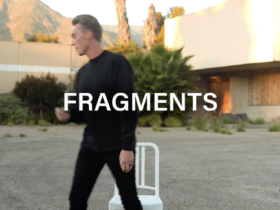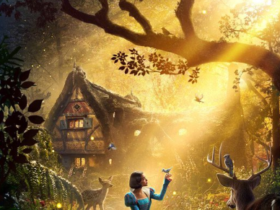When I spoke to first-time author Tanzania Glover, she told me that her primary literary influence was Terry McMillan. McMillan became a hero to Black women readers in the 90s because of her warm, affirming depictions of Black women’s struggles and friendships. Even as she’s been consistently underappreciated in the mainstream for books that are filled with dramatic plot twists and exceptional character development, McMillan is an icon to our community.
The spirit of Terry McMillan can be felt in Glover’s first novel, The Soundtrack: #musictomyears. The book draws readers in with its many ups and downs, but it carefully gives as much care to the lives of its Black women protagonists as anything we’ve seen in Glover’s idol.
Jauri, the story’s central figure, is a fiercely independent and opinionated woman looking to make her mark on the music industry. But she makes a series of unforced errors in her personal life (men, will do that to you) throughout the book’s 400+ pages that require her to be lifted up by her family and her best friend, Ashley. Despite the missteps, Jauri never loses herself. In fact, she provides an important reminder of the tenacity we’ll all have to tap into at some point.
We pick up different books for our different moods. The Soundtrack: #musictomyears is a light novel you’ll want to dive into for a fun escape to a world that centers Blackness. Tanzania Glover is putting a new spin on the familiar urban novel format that’s perfect for millennial Black women.
In our conversation, Tanzania Glover dove into the novel’s intricacies and her journey to publishing it.
– Kimberly Foster
Take this survey after reading our interview for a chance to get a free copy of The Soundtrack: #musictomyears.
For Harriet: All right, let’s start from the beginning. Where did the idea for this book come from?
Tanzania Glover: Before I was telling you about how I was so obsessed with celebrity culture and I thought I would try to turn it into something meaningful. You know how we all have our faves and what not and think we know how they are in real life. I’ve always wanted to write a book that showed the real stories or the story how I saw it for women who are real Black women. I don’t really wanna say real Black women, but Black women who are non bi-racial, not mixed, not always lighter. You know, how we don’t typically get to see women like that in the glamorous roles.
I wanted to write a book and see how putting someone like that in that role and seeing how they would react. I read a lot about the obstacles that some of the younger dark skinned Black women artists are dealing with and it disturbed me. For instance, I saw what’s happened with Sevyn Streeter. She has had some of her visuals lightened in the past.
I saw that happening with Normani Kordei from Fifth Harmony and Justine Skye and it’s just like, “Oh this is kind of what happens to them and it’s the norm.” I wanted to write about it and how it shouldn’t be acceptable and how to navigate the industry while still being true to yourself but trying to be successful as well.
For Harriet: Okay.
Tanzania Glover: I definitely had an agenda when I was going into it. I wanted to focus on that because we always talk about, “Well, why do we only see one shade of Black women or one look for Black women?” And I wanted to talk about this whole different take on the Black women who are now rarely put in these positions.
For Harriet: Is this your first book?
Tanzania Glover: This is the first that I’ve published.
For Harriet: How long did it take you to write it?
Tanzania Glover: I started writing it at 14 or 15. It was 2005, so 15. But I’ve taken several breaks. This is the third draft of it and I was determined to finish it this time. I got a lot of inspiration from trashy reality shows and Lipstickalley and just seeing a lot of big celebrity moments over the years. Definitely the whole Beyoncé Lemonade album. I love how that was described as a love letter to Black women. I thought like, “Well, what if I had the ear of the whole Black community, specifically Black women. What would I say to them?” And I came up with, “Your past doesn’t define you. Sure it’s a part of you and it will always follow you, but you’re not limited by it.” My Lemonade advice would be don’t accept mediocrity because Black women are always helping whoever needs help sometimes to our own detriment. When we help and give it’s not mediocre so we shouldn’t accept it back. You know, reciprocity and all that jazz. Just always have high standards and put your own needs and well-being first. You’ll live longer.
For Harriet: One thing I was really struck by is the majority of the book is set in Chicago. I feel like I don’t read a whole lot of books where that is the case, particularly books about entertainment. Why’d you make that choice?
Tanzania Glover: I am from Chicago. I researched Los Angeles. I researched New York, but I wanted to stay true to home because I’m most familiar here, so it felt completely natural writing about riding the train at night or being here, being there because I’ve seen those places. One scene in particular by the Chicago River where a character talks about being molested, I go to that spot every summer and I love those famous winding stairs. I’m so familiar with that so it felt really cool to put places that I go all the time and see and it just felt so much more special than if I were to research some random place in Los Angeles. I really enjoyed writing about Chicago. It’s actually funny because the sequel will not have any Chicago in it. For part two I’m going to have to do a lot of research and I’m considering traveling for it.
For Harriet: In the book if you read it carefully, it seems like there are some familiar Chicago artists or composites of artists that we might be familiar with.
Tanzania Glover: Yes, there are a lot of archetypes. The big phenomenal female artist who has a lot of stans and a huge, huge following. The narcissistic Gemini celebrity who is always in trouble because of his big ego. And it’s funny because I was just thinking, “Wow these celebrities are oddly going through a lot of stuff right now.”
For Harriet: Yeah.
Tanzania Glover: There’s a lot going on with celebrities as people and what it means to be famous is evolving in front of our eyes with social media. With this book, I wanted to give some background into how I view them and what I believe is the motivation behind some of their actions and their art. I was trying to be–I don’t wanna say relatable. It sounds so predictable. I guess I was trying to put out celebrity archetypes that we’re all familiar with.
For Harriet: What kind of function do you think that serves? Is it to hook in a reader when they feel like they can see Kanye is having a meltdown?
Tanzania Glover: I hope so. That was the plan.
So far the feedback that I’ve gotten has been amazing. People instantly recognize it because I’m so not great at being subtle, but the names were very deliberate. Everybody picked up on it and they actually really like that part of it. I’ve got the whole BeyHive who love the Beyoncé references and stuff like that. Wait I’m not supposed to confirm or deny who the characters are.
I think that was a great addition to it and it’s actually fun seeing people try and guess who the stars are based on because you have some big personalities in there. That’s always really fun.
For Harriet: One thing I really thought was innovative about the book was the structure. I was so drawn to this idea of each little section having an accompanied song to go with it and also I thought it was interesting how you switched between voices in the book. One moment you’re reading the protagonist, Jauri, and the next you’re reading Orrin. How did you come up with that?
Tanzania Glover: I’m gonna start with the first question. The songs happened because I’m a big music nerd. I listen to music 24/7. I have a catalog of music that’s out of this world and I listen to music when I write so I was almost thinking of these chapters as songs. I started out with song lyrics because I actually have a version with the song lyrics, but I couldn’t legally put those in the published version so I have it as a keepsake for myself. The song lyrics woven together beautifully tell the story for the book and it hurt to not be able to include them, but luckily I found a legal work around. I also have playlists on Spotify and YouTube for people who want to actually hear the music as they read.
For Harriet: You couldn’t legally use the lyrics because they’re copyrighted?
Tanzania Glover: Yeah.
I would have had to get the permission for 80+ songs. Some by the same artist, but that process would have taken so long. When I realized that, I was all done.
But the structure with the “his and hers” chapters and the dual chapters and the back and forth, I’m honestly just very scatter-brained. When I was writing, I would be at an event with Jauri then I would jump to Orrin and wonder what he was seeing? And I was so stuck on writing traditionally that I’d try to do her chapter ten pages, his chapter ten pages. I realized that it just didn’t work for me. I realized that I’m the boss so I really just made up the rules as I went because I hate trying to put everything into the same neat box. You’ll see some chapters are 20 pages while some are only 5. I would start and I would stop when it felt right and I liked it that way.
For Harriet: Have you seen another book that’s done this before because I haven’t?
Tanzania Glover: I haven’t either. I don’t want to claim that I’m the first to do it this way either because there could be others, but I just did what felt right for me and the story I wanted to tell.
Also, I wanted to directly connect to social media with the hashtag in the title and the musical element. I’m a one person team here. I wrote it. I did the editing. I created the cover. I did it all. So I was trying to be creative with my nonexistent marketing fund. There’s a lot of social media use in this book. So it’s like dating in the social media age and blocking people on Instagram. I’m on Twitter and it’s just so fun to me to see celebrities do this every day. We literally get news alerts. “Oh, this person blocked their ex or this person unfollowed so and so.” It’s so funny how it’s a part of everybody’s life and I just really wanted to talk about that as well.
For Harriet: Okay we’re gonna get into some of the plot points on that, but I’m just so shocked that you are saying that you did all of this yourself.
Tanzania Glover: Yeah I did and it took a while, but it’s mainly because I was broke and didn’t have a choice lol. I didn’t have money for an editor. I didn’t have money for someone to create a book cover. What I did was I taught myself how to use a Photoshop-type/Adobe program and during the free trial I created two covers– one for the first book and one for the sequel. I paid I think it was 23 dollars total for both images. I just designed them as simply as I could because after looking at the top 100 books on Amazon to see trends in cover designs, I saw that most were pretty simple. I thought, “Hey, I could do this.” I tried it and hopefully people will get what I was going for.
For Harriet: There is just so much happening in this book. I haven’t read a book like this in a long time. I read a lot of nonfiction, but I was engrossed in this. I thought it was really interesting that there are a couple of characters in this book that talk about suffering molestation or sexual abuse. I’m wondering why you felt it necessary to insert those kinds of plot points?
Tanzania Glover: First of all, my mom is a survivor. So that has been a big part of my life since I was born because she has never shied away from telling her story. She’s just such a hero to me for that because as black women we’re just expected to suffer in silence, but she told the truth. She’s always pointed her finger and said, “No, you did this to me.” Even when no one believed her and she was called crazy, she never wavered from the truth and I’ve always respected her for that.
I always want to dedicate at least a few lines for her in whatever I write because she’s just so brave and that’s something that happens in the Black community so much more than we’re willing to talk about so it was important to include that as delicately as possible.
It’s such a big plot point for Orrin. He was the child star who “things happened to” and he is still dealing with it and he thinks he’s over it, but he’s not. He pretty much has to realize that he’s never going to get over it. It’s something that happened to him. It’s a part of his life so he has to come to a point where he realizes that it’s not like a wound where it heals and then it’s fine. No, it’s always going to be slightly open. He’ll always have to treat it. He feels like, “It happened. I dealt with it. I did what people said I should do. I went to therapy. I talked about it so I should be fine.” That’s not the case and it always resurfaces. He has to deal with it and he chooses not to and we see what happens in the book.
For Harriet: I thought it was so interesting that you had both a woman and a man who were survivors of abuse. I feel like I don’t necessarily see the men’s perspective explored as much.
Tanzania Glover: For Book Two I actually go more in depth with it because one of my friends pointed out that I never used the words “raped” or “molested” in the book. I didn’t realize that. I guess I was trying to be sensitive because it is based on real celebrities and their stories and their rumors and what not. I was trying to be sensitive because I absolutely do not want to use that as a draw. I just wanted to write how I interpreted the situation as a fan of the artist and their subsequent behaviors. But Book Two actually explores that where he begins to say the words and really heal because Book One was just peeling off his bandage. He still has more growing to do as you can see by the ending.
For Harriet: I loved the character of Jauri.
Tanzania Glover: Me too! She is like every friend of mine. She’s so flawed, but I don’t care. I just love her. She’s so funny. She’s so relatable. She wants to be bougie so bad, but then she’s really down to earth. She’s just everything. She’s so talented.
For Harriet: I appreciated how she changed throughout the course of the book. I think that seeing her open up with Orrin and get hurt in the process it was so real. Her reaction to dealing with somebody trifling–I felt like those reactions were really honest.
Tanzania Glover: Right because she’s such a closed book. Like the people who are the closest to her, like her sisters and Ashley, don’t even know things about her that we do. So it’s almost like we’re her friends too because she told us everything with no filter.
For Harriet: She seemed like a really normal Black girl, you know. I love that you mentioned early about trying to write against the colorism that Black women experience or how we’re erased in media. I thought this is definitely somebody that I would know. And the way that you described her physically, it felt like somebody who was very familiar.
Tanzania Glover: She is just your normal Black girl in Chicago. She’s been through some stuff. She’s rolled around in the mud a little, but she’s dusted herself off. I love seeing her confidence grow, even though it got shaken through some of the plot points. I love seeing her, but especially someone who looks like her, still winning in the end.
I have this thing where I want to write this ruthless Black woman character who just does not care what anybody thinks and she is all about winning for herself. I actually have a separate book for that character, but I think about The Coldest Winter Ever. Every Black girl I know fiercely loved that book. The character Winter was so selfish and because of that she had to have a bad ending. She had to be tragic. It was like a warning. Like, “Black women don’t be like her.” I hated that because as “bad” as she was, I was rooting for her. I wanted her to win.
For Harriet: I love that. I love that about this book. Even despite all of the ups and downs in the plots, and there were lots of ups and lots of downs, I loved that on the very last page I felt like things in this woman’s life are not perfect, but she’s fine. She’s okay.
Tanzania Glover: She has every reason to fall and stay down, but she’s not. She is slowly getting back up. She’s being accountable for her actions and I love that about her because she’s not the kind of person that’s going to wallow forever. She’ll take her punches and she’ll, you know, be hurt because she’s normal and she has feelings. As you can see, she is very hurt, but she’s not going to stay that way. She can’t so she’ll reinvent herself again and again.
For Harriet: This book has a lot of drama in it. There are lots of twists and turns. It’s interesting to me that you were still able to balance the dramatic stuff, the things that can, if not handled properly, devolve into a soap opera or a bad reality show. I appreciate that you’re able to balance that.
Tanzania Glover: Thank you. I wanted to toe the line because we all have our guilty pleasures. I love Love & Hip Hop and Basketball Wives, but I didn’t want it to be that. I struggle with the respectability politics thing. I struggle with not wanting it to be–I don’t want to say “urban” because I am urban. I fully embrace that, but I didn’t want it to be stereotypical and cartoonish. I wanted a normal Black experience where the readers could say that it feels real because they’ve seen it or something like it.
For Harriet: Yeah, I love rejecting respectability politics. I can imagine that this is a book that somebody might write off as being you know too something. Did you worry about that or do you worry about that, or do you just feel like this will speak for itself?
Tanzania Glover: When I had to categorize it on Amazon, that was when it hit me again, like what category do I put it in? I thought urban romance. I think it’s an urban book. I think it’s a black pop culture book because I wrote it for Black women like myself. If anybody else reads it then that’s great for them, but this is for Black women. This is for us because we don’t get these kind of stories and we don’t get to see ourselves as the love interest—being doted on, as the special one. She’s [Jauri] all of that. Things happen, of course, but it’s not a “woe is me” story at all.
She doesn’t want that. She wants the spotlight. She wants that badly and she wants to work for it the honest way. This book was conceived pre-#MeToo movement, but it has a lot of the same themes of sexual harassment. You have to sleep with the guy whose finger is on the button. It has a lot of that and it wasn’t intentional, but it was. I wanted to talk about it casually because it’s not a big deal in the industry. It’s just not. I would love if my book could add to that conversation for black women’s treatment in the music industry and Hollywood.
I was actually shocked to see this movement pick up so much steam because when I was doing research, all I saw was how it’s just expected and accepted. You have to do these things, these “sexual favors” or you’re not gonna make it. It’s so normalized that I didn’t want to write about it like it was traumatic even though it is traumatic. Women should not have to do these things, especially to people that they look up to. Like these are their heroes who they find out are monsters in the worst way. But most have to weigh it and play the game accordingly because everyone else is. It’s just not fair for women to have to compromise themselves in order to be successful.
For Harriet: I loved that Jauri was in it and then she decided, “No, I don’t want to do this anymore.” She was in control of herself and her body.
Tanzania Glover: Yes. Book Two definitely explores it more. I’m gonna give you like a little spoiler because we already know Jauri’s not gonna stay away from music. She just can’t. So in the future, she has her own record label and she’s setting the example and doing things the right way for her artists. And when we’re talking about this topic, we have to be honest about why there’s so much abuse of power. It’s because men rule Hollywood and the music industry, hell the world, but specifically for entertainment I do believe a lot of this would go away if female label heads and producers and creators were represented more.
So yeah she is taking that next step in Book Two. But as far as Book One, the reason that she has so much control over herself and her image and her body was because she had the capital to do so. It was really interesting to see a Black woman do the right thing with her money and invest it in herself. The last couple chapters, when Orrin was trying to buy her out of her contract, she realized that she couldn’t let him because he would be using his money to basically buy her and not the contract so she had to do it herself.
For Harriet: I love that she was able to write her own checks.
Tanzania Glover: Yeah. She wrote her own check. She did it on her own terms. I wanted to come full circle with that because in the first chapter, we see her getting dressed to meet “Wayne”. She’s wearing her hair how he likes and wearing clothes that he picked out for her. But in the last chapter, she’s wearing her big hair how she wants to, dressed how she wants and she’s summoning him to her. I just thought that was so beautiful. I cried writing that scene. Like, “Oh, my God! It’s over. She’s done. My baby’s all grown up.” She’s not a victim. She’s just not into victimhood. And there’s nothing wrong with being a victim, but she recognizes that there are people who are victims to things out of their control. She feels that she controlled a lot of what happened to her in her past and would definitely be in control of things from that point on.
So she’s thinking about, “Where did I go wrong? What could I have done differently?” And she realizes that we look over red flags and signs and we compromise on things all because we like someone. We can’t do that anymore. I have readers that are still holding out for a certain ending in book two and I want to shake them because they didn’t get the message. He was not good for her at all!
She realizes exactly where she messed up. She takes responsibility for her part. Not for all of it, because it is not her fault. But she realizes where she will never compromise again and that’s really interesting for the sequel because she is put in a position where she could backtrack or she could just keep it moving. I really want her to remember the woman on the roof at the end of Book One that was saying she would never be in that situation again because she has learned from her mistakes.
For Harriet: I am glad that we had the conversation about how to categorize this because it felt really reminiscent of my favorite novelists. Do you have any people that you look up to, people who inspire you?
Tanzania Glover: Terry McMillan. I’ve read everything that she’s ever written. She’s like the quintessential author for true Black sisterhood, Black female joy, and getting up again after life punches you in the gut. She is just everything to me. She’s everything.
For Harriet: She’s literally amazing. One of the best conversations I’ve ever had in life was with Terry McMillan. She is literally the best.
Tanzania Glover: Oh, my God! I’m so jealous. I’m so jealous. It literally started for me. I was maybe five when Waiting to Exhale came out in theaters. I was there because my mom couldn’t get a sitter. I remember seeing Black women on the big screen loving on each other and fighting with each other, but that bond was still there. When I got older and realized that it was a book first, I had to read it! I found her other books and I’ve watched every movie based on them dozens of times. I just love how she showed the full spectrum of Black womanhood. She is just the greatest of all time.
For Harriet: Do you have any final thoughts about what you would want readers to take away from this book? You mentioned your Lemonade message of “Don’t accept mediocrity.” Is there anything else?
Tanzania Glover: I think the message is pretty straightforward. Love yourself more than you love anyone else. Have a code of conduct. Don’t have unprotected sex. Just don’t do it. That got her [Jauri] into a lot of trouble. I think as Black women, we have to be more in control about who we allow into our lives in that way because of kids and STDs. We see how much these things affect us in our community. This is something that is fully controllable and preventable. She didn’t get off easily, but Jauri is lucky that things weren’t worse for her. I just want us to take more responsibility for our sexual health because that is the beginning and the end to a lot of avoidable problems.
I really don’t want to come off as preachy because I have the tendency to come off that way in real life if you ask my friends. I am just so passionate about my love for black women and girls that I want to see us live long, healthy, fulfilled lives on our terms. Whoever we chose to date or be intimate with, I just want us to set healthy boundaries and live and do things for ourselves and not because someone manipulated us into it. That’s it. That’s the book in a nutshell.
Purchase a copy of The Soundtrack: #musictomyears.
See this #AmazonGiveaway for a chance to win: The Soundtrack: #musictomyears (Kindle Edition). https://giveaway.amazon.com/p/67b5fb60f80670c7 NO PURCHASE NECESSARY. Ends the earlier of Jul 14, 2018 11:59 PM PDT, or when all prizes are claimed. See Official Rules http://amzn.to/GArules.
Disclosure: For Harriet was financially compensated for this post.


















Leave a Reply